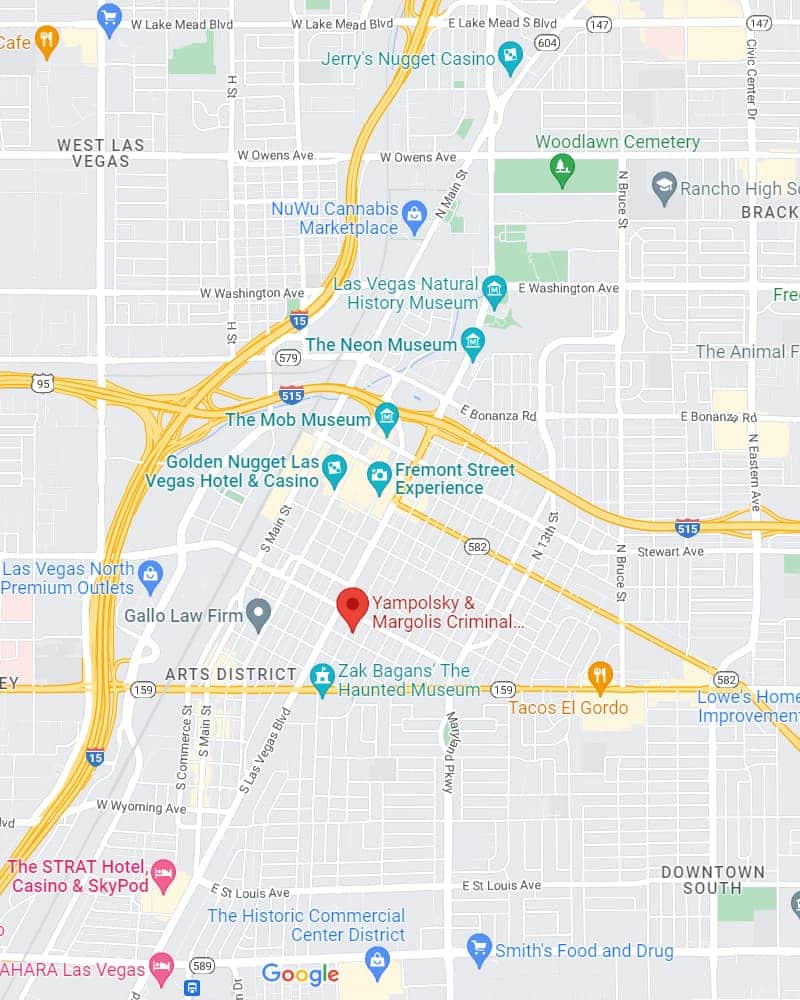Las Vegas Racketeering Defense Lawyers Getting Clients Justice

Whether you live in Summerlin, North Las Vegas, Henderson, Anthem, Mountain’s Edge, or anywhere in between, you should have a basic understanding of the RICO laws in our fine Silver State lest you become accused of not just being a criminal but even worse, an “organized criminal.” Racketeering charges are not a matter of history; they are still a very real legal issue today. If you are convicted of racketeering charges in Nevada, you can face a sentence of up to 20 years in federal prison and fines of thousands of dollars, depending on the nature of the crime.
Messing with the federal law is no game. To give yourself the best chance of a favorable outcome, you need talented criminal defense attorneys on your side to fight aggressively for your charges to either be dropped or to get a lowered sentence. The lawyers at Law Offices of Mace J. Yampolsky have spent more than 40 years fighting for individuals charged with criminal acts in Nevada, including organized criminal activity. We know how to present the case in a way that casts doubt on your guilt, making it harder to prove that you participated in the alleged criminal organization beyond a reasonable doubt. Contact us right away if you are facing racketeering charges by calling (702) 385-9777.
How Did the Rico Statute Come About in Nevada?
RICO is an acronym that has become shorthand and is rarely even delineated into its component parts nowadays. RICO means Racketeering Influenced and Corrupt Organizations Act, and its long and colorful history in the United States goes back nearly fifty years to when it was enacted in 1970.
Since its creation, the RICO Act was meant to serve as prosecutors’ “ultimate weapon” to combat mob and gang violence in major cities in the advent of the more sophisticated manner in which networks of criminals engaged in loan sharking, drug trafficking, counterfeiting, money laundering, illegal bookmaking, prostitution and a host of other misdeeds. These criminals had previously managed to escape major exposure because individual prosecutors prosecuting disparate offenses resulted in considerably shorter prison sentences. This was clearly ineffective to combat the growing crisis of organized crime in most of the nation’s major cities.
Slowly but steadily, state after state in our union adopted similarly worded and designed racketeering statutes designed to curb the illegal activities of mobsters, white supremacists, cartel drug traffickers, and even sophisticated and stealthy “skimmers:” criminals who target Las Vegas in large part because so many persons from around the country—the world even—are kind enough to stop in and deposit their money with us, often permanently. This high volume of tourist cash makes Clark County a very desirable target for enterprising, ambitious, and organized criminal syndicates.
If you are charged with money laundering or other organized crime in the Silver State, you are not alone. You will need knowledgeable and confident defense attorneys who will stand by your side and get you the outcome you are looking for.
What Constitutes a RICO Violation Under Nevada Law?
In Nevada, the elements for a claim of civil RICO violations (Racketeering Influenced and Corrupt Organizations Act) are:
- Defendants engaged in racketeering activities as defined in NRS 207.390 and a racketeering enterprise as is defined in NRS 207.380;
- Defendants acting directly, and in conspiracy with one another or through their syndicate, participated directly in racketeering activity by engaging in at least two crimes related to racketeering;
- Defendant’s activities have the same or similar pattern, intent, results, accomplices, victims, or methods of commission, or otherwise interrelated by distinguishing characteristics and are not isolated events;
- Defendant acquired or maintained directly or indirectly an interest in, or control of, any enterprise, or defendants are employed by or associated with any enterprise to conduct or participate directly or indirectly in the affairs of the enterprise through a racketeering activity;
- Plaintiff’s injuries flow from the defendant’s violation of a predicate Nevada RICO act;
- Plaintiff’s injury was proximately caused by the defendant’s violation of the predicate act;
- Plaintiff did not participate in the commission of the predicate act; and
- Plaintiff is entitled to institute a civil action for recovery of treble damages proximately caused by the RICO violations. NRS 207.470(1)
What is the Best Defense Against Racketeering Charges?
In the past twenty years, there has been a substantial development of Nevada law on each of these identified elements, giving creative and attentive defense attorneys new ways to attack these draconian and peculiarly circumspect charges. On the other hand, going about building a defense on your own can be extremely tricky and is unlikely to yield the results you are after. If you are facing racketeering charges, the first and most important step to defending yourself is hiring criminal defense attorneys so you can take advantage of our years of experience and skills in helping clients find justice.
For additional information on these elements, feel free to make use of the cases referenced below:
Recent cases interpreting NRS 207.470:
- Stoddart v. Miller, 2008 WL 6070835 (Nev. 2008 );
- Siragusa v. Brown, 114 Nev. 1384, 971 P.2d 801 (1999);
- Gordon v. Eighth Judicial Dist. Ct., 12 Nev. 216, 231, 913 P.2d 240, 250-51 (1996);
- Cummings v. Charter Hosp. of Las Vegas, Inc., 111 Nev. 639, 896 P.2d 1137 (1995);
- Allum v. Valley Bank of Nevada, 109 Nev. 280, 849 P.2d 297 (1993); Hale v. Burkhardt, 104 Nev. 632, 634, 764 P.2d 866, 867 (1988).
Can Our Racketeering Defense Attorneys Help You?
If you have been charged with racketeering, then you should consult an experienced Nevada criminal defense attorney to help! Please don’t feel that you have to take on the federal government on your own without knowledgeable attorneys to help with your criminal defense. You deserve excellent legal representation during this challenging endeavor, and you can find it at Law Offices of Mace J. Yampolsky. We have been helping people with these types of federal criminal defense charges for over thirty years! Hiring a racketeering defense attorney can give you the best chances possible to have your federal RICO charges cleared. Give us a call for a free consultation at (702) 385-9777.



